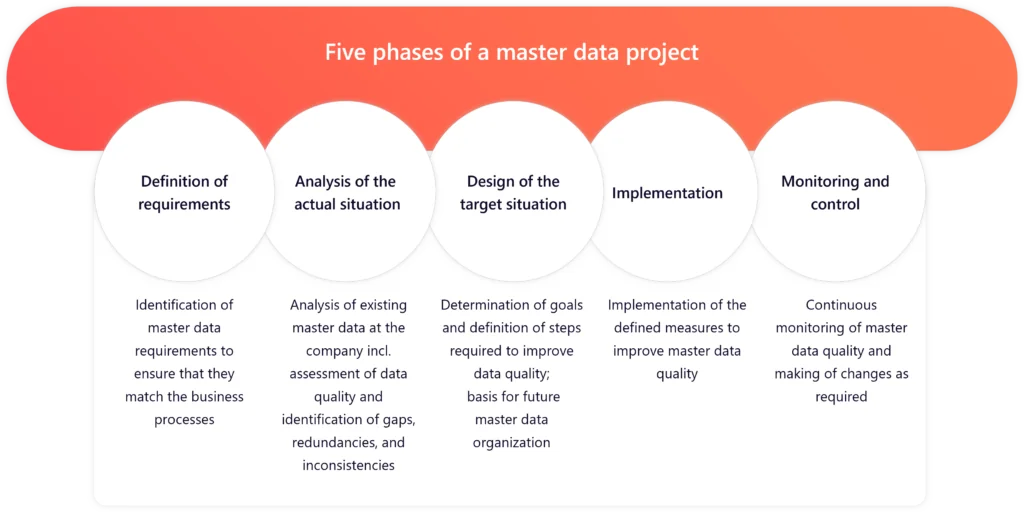Actively participation in shaping customers’ SAP master data processes
December 8, 2023

December 8, 2023

Andreas Lisson is SAP Senior Consultant at valantic and in this role actively contributes to SAP master data processes and migrations in customer projects. In this interview, he provides exciting insights into his work as a master data expert and tells us what SAP and master data enthusiasts can look forward to at valantic.
I started at valantic in 2021. Even during my onboarding, I felt very comfortable. From the very beginning, I was very well received by my colleagues and was able to get started in SAP consulting on customer projects right away. My focus is on master data consulting and migration. In these areas, you work with almost all the SAP modules and related innovations, and you also work closely with many different people from the relevant customer departments. That’s why my job is super varied.
Privately, my wife and I have just had our first child, and we are very happy. For me, parental leave was very valuable, and I was very pleased that in valantic, I found an employer that also believes in maintaining a good work-family balance. In my free time, I like to go places with my family or go to the movies. In addition, I am interested in soccer and watches – also in how watches are made, which, however, does not work out so well because I’m not that coordinated…
Master data is basic information about customers, suppliers, materials, etc. that is critical for a company’s smooth operation. It is immensely important as a central element in every project, but unfortunately it is often neglected. For me, this topic is just as important as other SAP module topics. In addition, you gain insight into all SAP core processes, because they use all master data such as materials, customer master records, supplier master records, parts lists, etc.
In addition, I found the complexity of SAP master data a challenge that I gladly accepted to strengthen my understanding of data management, databases, data structures, etc. I also enjoy sharing my knowledge. For example, working with my colleague Claudia, I have just created an online course about the new data object “Business Partner” in SAP S/4HANA, which will soon be published on the Espresso Tutorials learning platform.
My focus is on master data advising and migration. As a master data management team, we analyze our customers’ master data requirements and develop solutions for consistent data structures and transparent processes. This includes support for data cleansing to ensure high-quality master data. We use a variety of tools to ensure data integrity and data quality. This also includes the MDC Master Data Cockpit , an SAP add-on developed by valantic for master data maintenance. Precise work is necessary for the data migration to be realized within a planned time frame and with as little downtime as possible for the customer.
In SAP S/4HANA projects, we ensure a smooth data migration. Here, I work closely with teams from other SAP modules to ensure seamless data integration. In addition, I perform tests and take quality assurance measures to ensure the correct functionality of master data transactions and I train users and key users.
In my view, the most important tasks are to ensure a high level of data quality on a permanent basis, to gain transparency in the processes and to give this often-subsidiary topic higher internal priority with customers.
Simply put, the process of a typical master data project is divided into five phases. Initially, master data requirements are defined to ensure that they meet business requirements. Then comes the analysis of the actual situation with the assessment of data quality and identification of gaps, redundancies, and inconsistencies. In the following design phase, we define goals and define the necessary steps to improve master data quality. This is the basis for the future master data organization and the associated processes for a consistent master database. In the implementation phase, we take the necessary measures for optimized master data management and set up the systems and processes that our customers require. The final monitoring and control phase serves the continuous quality assurance of the master data.

There are five measures or steps that I recommend to companies to prepare themselves:
For more details, see my blog article “Managing data migration: 5 master data steps to take for a successful S/4HANA transformation”
Here are some things you can really look forward to: For example, a great team with colleagues who are all over Germany and like to come together for events and team events. In addition, a great employer that not only enables, but actively supports flexible working hours and parental leave. My parental leave went wonderfully; to me, that proves that this is very possible at valantic.
And at the same time there are interesting and complex projects and tasks: From needs assessments with the help of workshops, to the development of master data concepts and their implementation, to migrations with deep insight into SAP technologies. This means that you also work closely with other people on the technical implementation of migrations and data quality analyses, for example. Since valantic, as an employer, places great emphasis on its employees’ development, there are many further training opportunities, whether in the area of master data management or for other SAP modules, so you can always expand your horizons. For this purpose, valantic has its own Learning Hub with numerous training offerings from various providers.

Would you like to learn more about career opportunities at valantic?
Don't miss a thing.
Subscribe to our latest blog articles.